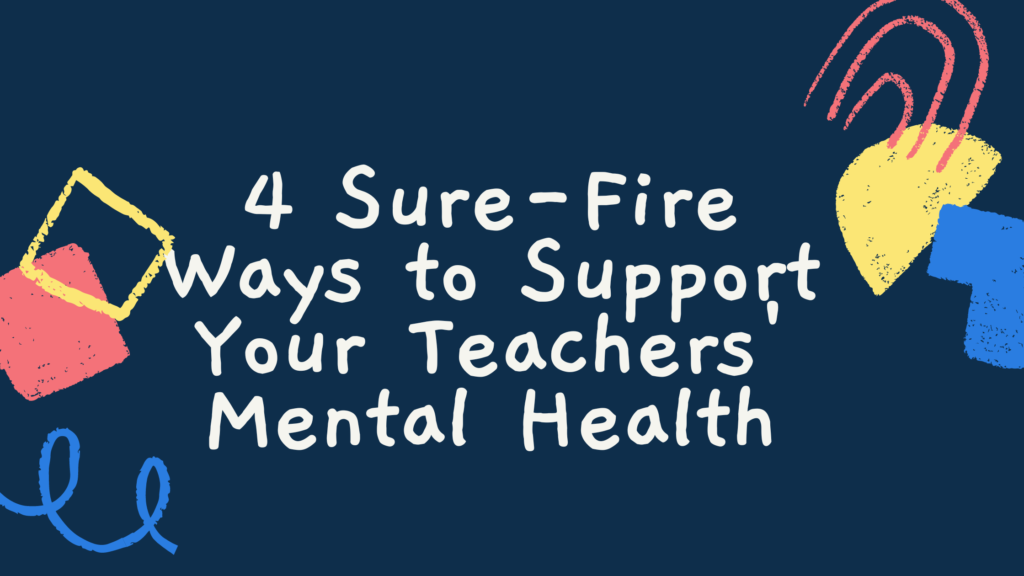
Teachers return from summer break with mixed feelings. Excitement over a new school year and eagerness to meet your students mix with apprehension and stress about testing and expectations placed on you. All those emotions plus the extra work affects teachers’ mental health. We hope all of you have spent some time resting and being refreshed this summer.
The start of a new school year is both an exciting and stressful time. It’s more important than ever that you take care of yourself during the exhausting first weeks of school. We encourage parents, friends, and family of teachers to support your teachers’ mental health during back to school as well. We’ve put together a few ideas about how we can all support teachers’ mental health during back to school.
Ways Parents May Support Teachers‘ Mental Health
Parents, you are an integral part of your child’s education and often provide the most help to teachers, especially during these first few weeks of school. Here are a few ways you can support your child’s teacher both during back-to-school and the rest of the school year.
- Prepare Your Child to Learn. Helping your kid be prepared to learn aids their teacher more than you realize. Ensure your kid enjoys a good night’s sleep, a nutritious meal, and weather-appropriate attire. Well-rested, well-fed, and comfortable students are better learners, listeners, and participants.
- Help your child with homework. Homework is typically assigned to reinforce classroom skills or assess a child’s comprehension. Homework teaches responsibility. Help your student establish a working and learning environment by setting aside time for homework. Never do your child’s schoolwork for them; provide support and check for comprehension. If your child is struggling with a concept, leave a note for the teacher on the homework or send them a message to share you concern.
- Classroom Volunteer. Classroom involvement may take various forms. Parents may escort field trips, interact with small groups, run an activity station, or help with special projects. Some parents may share a skill, collection, or cultural activity. Whether you can volunteer once or twice during the school year or every week, all participation is valuable. Most teachers welcome additional classroom help.
- Volunteer to organize book orders, cut letters or shapes for projects, prepare art materials, staple, or assemble books. Most teachers do many things on their own time and are more than happy to welcome volunteers—this is critical behind-the-scenes assistance. It’s a perfect activity for parents who prefer not to interact with other children or who aren’t available during school hours.
How Teachers Can Take Care Of Themselves
Self-care is vital in times of severe stress. Teachers should practice self-care, especially during the first weeks of school. Try these ideas.
- Turning off work. We know it’s hard to step away when you have so much work to finish in the few hours you are away from your students. Setting boundaries, however, protects your mental health and gives you valuable time with your family. Set aside a specific time for grading papers and responding to communications from parents. Be clear with parents about your availability outside of school hours. Give them a window of time throughout the day during which they may expect an email response from you.
- Taking a break from social media. If you’re excessively affected by the news and social media, take a break, especially if the topic concerns your school, district’s administration, or coworkers.
- Set realistic goals for yourself. Teachers wish they could improve the world by eradicating all of their students’ problems. Rest assured, you are improving the world one student at a time. You are people too; don’t forget that. Kindness to yourself means setting realistic goals. Consider both your ideal and realistic outcomes.
- Ask for help. Every teacher has that one child or parent that you just can’t figure out. Talk to your co-workers or other teacher friends and brainstorm solutions. On the flip side, not all the issues teachers face directly relate to their students. Don’t be afraid to reach out to a mental health expert when depression, anxiety, or stress become chronic and impair daily functioning.
- Plan some physical activity into your schedule. Teachers spend hours on their feet, but maintaining physical and mental health may be done via activities such as walking, biking, running, and yoga. Physical activity improves your brain health too. A fifteen-minute walk may help you clear your mind or find innovative solutions for classroom or personal problems. It’s impossible to complete everything and self-care is essential. Be honest with yourself about what you can accomplish in a day, especially during the first few weeks of a new school year. Make physical activity a priority.
- Check-in with co-workers. You’re probably already doing this whether it’s conscious or not. Daily or weekly check-inswith your coworkers provide an excellent opportunity for mutual support and to discuss solutions to problems you’re all facing, such as adjusting lesson plans or dealing with worried parents. Sharing your frustrations as well as funny moments with a trustworthy coworker can also provide a sense of stress-relief.
- Schedule your meals. This one you can do before school ever starts. Plan meals for the week beforehand so you can focus on schoolwork. Making and freezing meals before school makes the first week back less hectic.
- Don’t schedule any significant events for the first weekend back to school. Put in some much-needed relaxation time or get caught up on some educational tasks over the weekend. Don’t plan on dinner out that first Friday night. Instead, order in and allow yourself time to decompress.
We love supporting our teachers! Our school-based clinic provides medical care for both students and faculty at Mantachie schools. And our mental health counselors are available for appointments Monday-Friday.






